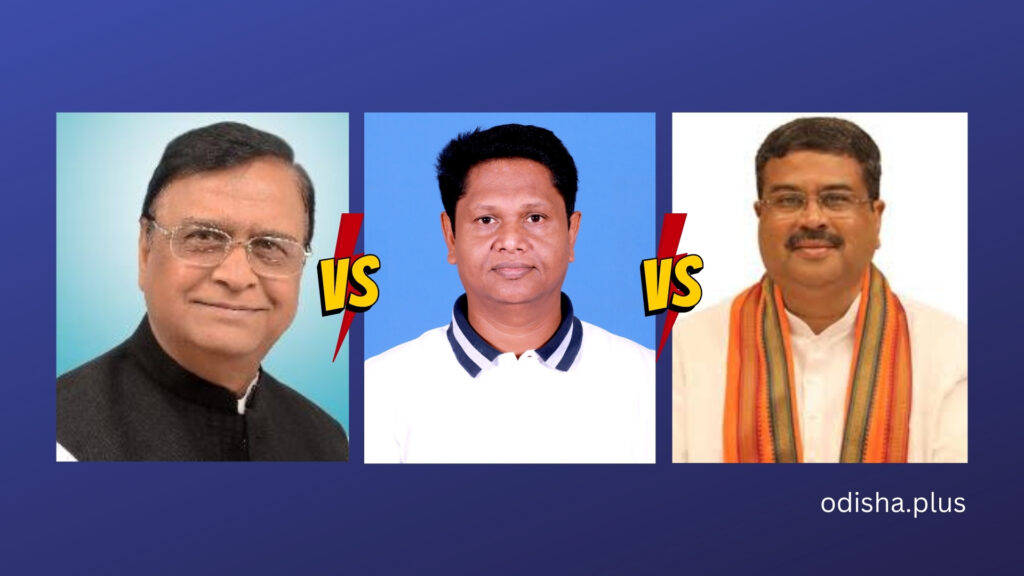Bhaskar Parichha

This sudden change in candidate has sparked speculation and excitement among the voters in Sambalpur. Nagendra Pradhan’s entry into the race has added a new dynamic to the election, as he brings with him experience and a track record of winning the seat in the past. His familiarity with the constituency and his previous stint as a Minister could work in his favor, as he already has a certain level of support and recognition among the voters.
On the other hand, Dulal Chandra Pradhan’s removal as the candidate has raised questions about the Congress party’s strategy and decision-making process. Some believe that this move could potentially harm the party’s chances in the election, as it may lead to confusion and disunity among the party members and supporters.
With the stage set for a three-way battle between the Congress, BJD, and BJP candidates, the Sambalpur Lok Sabha seat has become even more unpredictable and intriguing. The outcome of this election will not only determine the future of the constituency but also have implications for the political landscape in Odisha as a whole. Voters in Sambalpur will now have to carefully consider their options and make an informed decision on Election Day.
A loyal party worker of thirty years suddenly became unwelcoming when Nagendra Pradhan, aged 71, was chosen as the Congress candidate just three days after joining the party. This unexpected turn of events raised eyebrows and sparked discussions among party members and political analysts alike.
Dulal, a seasoned politician and a trusted member of the Congress party, had initially been selected as the candidate for the prestigious Sambalpur seat. With his years of experience and deep understanding of the local issues, Dulal seemed like the perfect choice to represent the party in the upcoming elections.
However, the party’s updated list, released on April 28, brought a surprising twist. Nagendra Pradhan, a relative newcomer to the party, suddenly replaced Dulal as the Congress’ candidate for the western Odisha seat. This decision left many party workers and supporters puzzled and questioning the party’s selection process.
Nagendra’s swift rise within the party ranks raised suspicions of favoritism and backroom deals. How could someone who had only joined the party three days ago be chosen over a dedicated party worker with decades of experience? The sudden change in candidate selection left a bitter taste in the mouths of many loyal Congress supporters.
While some speculated that Nagendra’s selection was a strategic move to attract a different demographic of voters, others believed it was a result of internal power struggles within the party. Regardless of the reasons behind the decision, it was clear that Nagendra’s selection had caused a rift within the party and had left Dulal and his supporters feeling betrayed.
The sudden shift in candidate selection also raised questions about the Congress party’s commitment to its long-standing members. How could someone who had dedicated thirty years of their life to the party suddenly be cast aside for a newcomer? This incident highlighted the challenges faced by loyal party workers who may feel undervalued and unappreciated.
As the elections gain momentum the Congress party faces the task of reconciling the disgruntled supporters of Dulal Chandra Pradhan and ensuring unity within its ranks. The incident served as a reminder of the delicate balance between rewarding loyalty and embracing new faces in politics.
The outcome of the elections would determine whether Nagendra Pradhan’s selection was a strategic move that paid off or a decision that further divided the party. The incident would undoubtedly leave a lasting impact on the Congress party and its approach to candidate selection in the future.
The surge in candidates switching parties during the 2024 elections in Odisha is a notable phenomenon that has caught the attention of political observers. One of the primary reasons behind this trend is the lack of ticket allocation within their respective parties. Many candidates feel that they have been overlooked or unfairly treated when it comes to the distribution of tickets for the upcoming elections.
Interestingly, rival parties have been quick to welcome these candidates with open arms. This is a clear indication of the discontent and frustration that exists within the political landscape of Odisha. Parties see this as an opportunity to strengthen their own ranks and weaken their opponents by attracting experienced and influential candidates from other parties.
It is important to note that this discontent with party decisions is not exclusive to the Congress party. Even the ruling Biju Janata Dal (BJD) has witnessed prominent leaders parting ways with the party just before the State’s simultaneous Lok Sabha and Assembly elections. This highlights the widespread dissatisfaction among politicians in Odisha.
One such example is the resignation of Rasheswari Panigrahi from the BJD. Panigrahi, who had previously been elected to the Assembly from the BJD in 2014, decided to leave the party due to its decision to field candidates from outside the district, such as Pranab Prakash Das. This move by the party was seen as a betrayal by Panigrahi and many others who felt that local candidates should be given priority.
The fact that prominent female leaders are also parting ways with their parties adds another layer of significance to this trend. It highlights the growing dissatisfaction among women politicians and their desire for more inclusive and fair decision-making processes within their parties.
Overall, the surge in candidates switching parties during the 2024 elections in Odisha is a clear reflection of the discontent and frustration that exists within the political landscape of the state. The way of ticket allocation and dissatisfaction with party decisions has prompted many politicians to seek new opportunities elsewhere. This trend has not only affected the Congress party but also the ruling BJD, as prominent leaders from both parties have decided to part ways.
Simarani Nayak, the Hindol MLA, tendered her resignation from the BJD on April 22, before the Panigrahi incident. Following the denial of a ticket to contest the Assembly polls, Nayak decided to step down from the primary membership of the party. Dhenkanal MP Mahesh Sahu was her replacement.
At least five incumbent BJD MLAs, including Arabinda Dhali (Jaydev), Premananda Nayak (Telkoi), Parsuram Dhada (Soro), and Ramesh Chandra Sai (Athmallick), have recently stepped down from the BJD due to not being given party tickets. Prior to that, two BJD MPs, Bhartruhari Mahatab and Anubhav Mohanty, had also resigned from the party.
The behavior of voters is still uncertain. Will turncoats be preferred? Only election results will tell that.
(The author is a senior journalist and columnist. Views expressed are personal.)

















